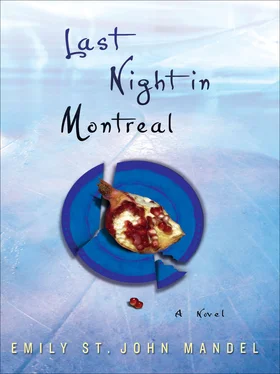But they didn’t stop. He was afraid, he told her much later, that if the two of them paused too long anywhere, especially in the early days, she’d start to dwell on things: the increasing strangeness of her upbringing, the missing parts of her family, events that may or may not have transpired just before he’d taken her away. There were weeks that were mostly spent driving; singing along with her father in a car passing over an infinity of highways, making friends with waitresses in small-town cafés, conjugating Italian verbs in motel rooms from California to Vermont and then Spanish all the way back west again. Her father regretted that he couldn’t send her to school, he said, but to make up for it he wanted to teach her all the languages he knew. In the glove box they carried a battered prayer card for St. Brigid of Ireland, the patron saint of fugitives; Lilia’s father wasn’t religious but said the prayer card couldn’t hurt.
This was a skittish, almost catastrophic life, in which nothing was certain; paradoxically, Lilia was unusually calm. Nothing could startle her. She was profoundly unafraid, although there were near disasters: when she escaped from the motel in Cincinnati, police rapping on the door of the motel room as she squeezed out the bathroom window and dropped down into the wet grass and then climbed through a dark hedge and sprinted, her frantic father waiting in the parking lot of a gas station half a block away, she was calm all the rest of that night. Her father asked if she was scared, and she said she was too old to be afraid of things. She knew something about getting older: she was almost ten and a half. And it was true that her voice was tense when she asked if the police were still close, but it was also true that she was asleep within a couple of hours. Her father that night was scattered and frantic, driving fast but trying not to speed, looking in the mirror for flashing lights and glancing sideways at his daughter and fraught with directionless guilt, trying to drive away quickly and take care of her and let her be all at once. Hours out of Cincinnati he said something and she didn’t answer, and in the passing lights of automobiles he saw that she’d fallen asleep. He tuned the radio to a classical music station, Chopin and then Mendelssohn with the volume low, night lullabies, and he hummed softly to the music and drove all through the night.
At the end of November, Eli received a postcard from Montreal. There was no return address. The front depicted a pretty line of grey stone houses with flowerboxes and iron staircases that spiraled from the second floors down to the street, with Montréal in drop-shadowed italics across the bottom. The back held a peculiar message, scrawled in what very clearly wasn’t Lilia’s handwriting: She’s here. Come to Club Electrolite on Rue Ste.-Catherine, and raise a white flag on the dance floor. I’ll see you. Come here soon. Michaela.
If the whole business of life on earth had ever made sense to him, it ceased to at that moment. She unmoored him, her departure made him want to disappear, et cetera — but if the world was askew in the time after he met her, in the time after she left, the postcard spun it entirely from its axis. The day at the gallery passed like a dream. He took the postcard and the continental map to the usual café, where Thomas had been camped out for two weeks trying to pick up a new waitress. Thomas stared at the postcard, whistled softly and shook his head.
“What would you do?” Eli felt fairly unhinged.
“I’d tear up the postcard and go find another girl. Or if you can’t do that, at least forget about this one.”
“What if she needs help?”
“What if she doesn’t? This isn’t a ransom note, it’s just a weird message on the back of an ugly postcard. What if this is some kind of sick joke she’s pulling, some ploy to get you back?”
“I have to go to her.”
“No, you have to move on. What kind of a person disappears like that? Look, things happen. Life continues. So you had a girlfriend who disappeared.”
“Easy for you to—”
“Do you think no one’s ever left me? You can’t chase after them,” Thomas said. “When they leave like that, they’re screwed up, and when they’re screwed up, you can’t save them. You can’t save them. You just have to let them go.” He made an airplane-like letting-go motion with one hand, jetting off to the left. Eli followed it with his eyes and then looked at the postcard again. “You just have to put your life back together and move on and pretend you never knew them, you just have to let them do whatever it is that they can’t do with you around. It’s the way it is.”
“Thomas, this isn’t her handwriting. Leave aside the fact that she left me, I have a postcard that someone’s written about her from a foreign city.”
“She left you, and you want to go find her?”
“I just want to make sure she’s okay. I know she left me, it’s just, I don’t think she has anyone else.”
“She might be with someone else, have you considered that? Some other guy could just. . Eli, I’m sorry, wait. .”
Eli stood up and pulled his coat from the back of his chair, the map in his other hand. Thomas made a grasping motion at his arm, which he evaded. Out through the warmth of the café with the map crumpled in his fist, Thomas calling after him, and outside night was falling and it was far too cold. He had a frantic desire to get out of Williamsburg, out of Brooklyn altogether, and found himself walking quickly toward the L-train stairs. There was a girl playing a guitar on the subway platform, sitting on a folding stool. She was singing soft songs about love and pay phones, almost to herself, until the sound of the oncoming train canceled everything. In the crowd that spilled out through the train doors there was an old woman pulling a little boy by the hand; the boy had a harmonica and played a long, wavering note in a minor key as Eli stepped into the train. He sank down onto a plastic bench and stared up at an overlit advertisement for skin care (“Dr. Z sees every patient personally!”) for all of the long clattering journey under the river, and then up the stairs into the lights and sounds of the Manhattan street. He walked aimlessly down First Avenue against the wind.
He stopped at a Don’t Walk signal somewhere deep into Chinatown, waiting for the direction of traffic to change. A bottle had been smashed in the gutter. He stood staring at it for a while, the mesmerizing sparkle of broken glass. A van paused a beat too long in the intersection and was attacked by a blaring cacophony of car horns. The sound brought tears to his eyes. He stood on the corner while passersby streamed around him like ghosts and lights changed from green to red to yellow to green again and the stream of traffic before him continued unchecked. He looked down and flecks of glass on the pavement sparkled, like crystal, like ice, tears blurring the pinpoints of light. It was a long time before he could force himself into motion.
. .
“TELL ME ABOUT MONTREAL,” he said to Geneviève. Thomas and Geneviève had been arguing earlier, but the argument was lost in passion and long words. Now they were both a bit flushed, mutually offended, and reading different sections of the same paper without speaking. Geneviève was making occasional notes in a weathered spiral-bound notebook. She had a scribbly, doctor’s-prescription way of writing that produced long lines of cramped hieroglyphics, and he had been watching her write. It was the first thing he’d said in an hour.
“I thought maybe you’d forgotten how to talk,” she said. “Why Montreal?” But her eyes held a sudden light. She loved talking about Montreal. She’d spent the early part of her life there. Her parents had moved her to Brooklyn when she was nine, but she still considered herself something of an expatriate and took enormous pleasure in pronouncing her name in French.
Читать дальше












